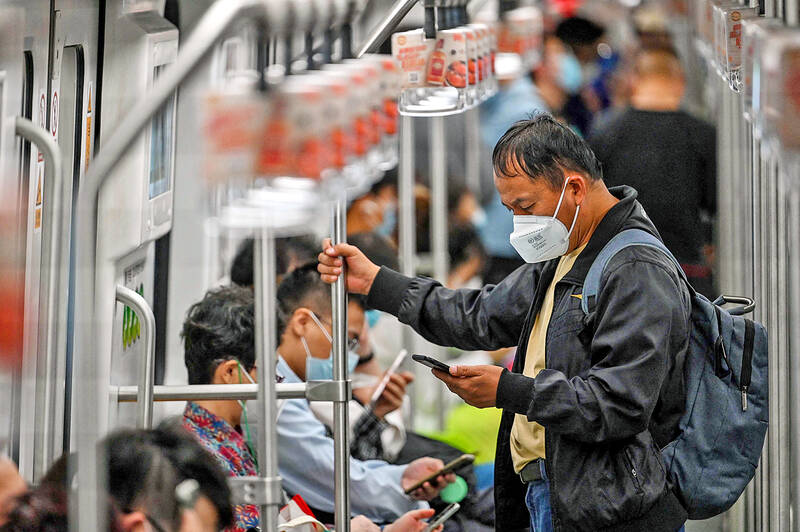China is to raise its retirement age for the first time since 1978, a move likely to slow a decline in the labor force, but anger workers already wrestling with a slowing economy.
The country’s top lawmakers endorsed a plan to gradually delay retirement for employees, Xinhua news agency reported yesterday.
Men’s retirement age would increase from 60 to 63, while women’s would rise from 50 and 55 to 55 and 58, the report said.

Photo: Hector Retamal, AFP
The changes would take place over 15 years, starting on Jan. 1 next year, it said.
“Governments at all levels should actively respond to the aging of the population, [and] encourage and support the employment and entrepreneurship of workers,” the Standing Committee of the Chinese National People’s Congress said.
They also called on officials to protect workers’ rights and improve care for elderly people, and empowered the State Council, China’s Cabinet, to adjust the measures if necessary. The approval followed a July announcement that the retirement age would rise in a “voluntary, flexible manner.”
Allowing more people to work longer would counter demographic headwinds weighing on China’s economy, although it risks adding to public discontent amid an economic slowdown.
“The timeline of raising the retirement age is pretty gradual. Policymakers probably have taken into account the potential negative impact and calibrated that carefully,” Societe Generale SA greater China economist Michelle Lam (林雪潔) said.
The document said that starting in 2030, China’s workers would also have to pay longer into their pension accounts before they are eligible to receive their retirement payout. The requirement would be raised to 20 years from 15.
The top legislature’s discussion of the plan earlier this week triggered an outpouring of anger on social media, with many people complaining about a sluggish job market.
Some also said that employers often discriminate against older candidates, a problem that the Chinese government last month vowed to address.
China’s retirement age is among the world’s lowest, despite significantly increased life expectancy.
Since at least the 1970s, the threshold for workers has been kept at 60 for men and between 50 and 55 for women. The change would see women’s retirement age rise to 55 for ordinary workers and 58 for those in management positions.
A bigger tax base and delayed access to benefits would relieve the pressure on the government to fund pensions as the population rapidly ages, with the birthrate falling to a record low last year.
“The sustainability of the pension system may be the main consideration behind the move,” said Ding Shuang (丁爽), chief economist for greater China and North Asia at Standard Chartered. “The impact on the economy in the short term should be limited as the hike is gradual.”
People aged 65 or older are expected to make up 30 percent of the population by about 2035 from 14.2 percent in 2021, a report by state broadcaster China Central Television said on Tuesday.

Hon Hai Precision Industry Co (鴻海精密) yesterday said that its research institute has launched its first advanced artificial intelligence (AI) large language model (LLM) using traditional Chinese, with technology assistance from Nvidia Corp. Hon Hai, also known as Foxconn Technology Group (富士康科技集團), said the LLM, FoxBrain, is expected to improve its data analysis capabilities for smart manufacturing, and electric vehicle and smart city development. An LLM is a type of AI trained on vast amounts of text data and uses deep learning techniques, particularly neural networks, to process and generate language. They are essential for building and improving AI-powered servers. Nvidia provided assistance

GREAT SUCCESS: Republican Senator Todd Young expressed surprise at Trump’s comments and said he expects the administration to keep the program running US lawmakers who helped secure billions of dollars in subsidies for domestic semiconductor manufacturing rejected US President Donald Trump’s call to revoke the 2022 CHIPS and Science Act, signaling that any repeal effort in the US Congress would fall short. US Senate Minority Leader Chuck Schumer, who negotiated the law, on Wednesday said that Trump’s demand would fail, while a top Republican proponent, US Senator Todd Young, expressed surprise at the president’s comments and said he expects the administration to keep the program running. The CHIPS Act is “essential for America leading the world in tech, leading the world in AI [artificial

DOMESTIC SUPPLY: The probe comes as Donald Trump has called for the repeal of the US$52.7 billion CHIPS and Science Act, which the US Congress passed in 2022 The Office of the US Trade Representative is to hold a hearing tomorrow into older Chinese-made “legacy” semiconductors that could heap more US tariffs on chips from China that power everyday goods from cars to washing machines to telecoms equipment. The probe, which began during former US president Joe Biden’s tenure in December last year, aims to protect US and other semiconductor producers from China’s massive state-driven buildup of domestic chip supply. A 50 percent US tariff on Chinese semiconductors began on Jan. 1. Legacy chips use older manufacturing processes introduced more than a decade ago and are often far simpler than

Gasoline and diesel prices this week are to decrease NT$0.5 and NT$1 per liter respectively as international crude prices continued to fall last week, CPC Corp, Taiwan (CPC, 台灣中油) and Formosa Petrochemical Corp (台塑石化) said yesterday. Effective today, gasoline prices at CPC and Formosa stations are to decrease to NT$29.2, NT$30.7 and NT$32.7 per liter for 92, 95 and 98-octane unleaded gasoline respectively, while premium diesel is to cost NT$27.9 per liter at CPC stations and NT$27.7 at Formosa pumps, the companies said in separate statements. Global crude oil prices dropped last week after the eight OPEC+ members said they would